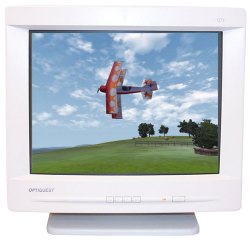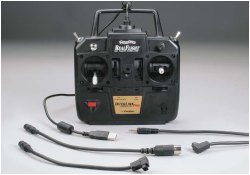Introduction to Simulators
Simulators can be an invaluable tool for improving your flying skills or learning if you are just beginning. Here's why . . .
 To simulate or not to simulate—is that the question? Well, for more and more modelers, the answer is yes! R/C flight simulators have become a mainstay of the industry and for some very good reasons.
To simulate or not to simulate—is that the question? Well, for more and more modelers, the answer is yes! R/C flight simulators have become a mainstay of the industry and for some very good reasons.
First, and foremost, simulators can go a long way in teaching you how to fly. We have consistently found that beginners who have spent some time on an R/C simulator will solo faster and have fewer problems when at the field controlling the real thing than their counterparts that have had no simulator training.
Even if you already know how to fly, simulators can help in advancing your skills. There are many manoeuvres of aerobatics, for instance, that one may be very hesitant about trying with your actual model (or perhaps you have not yet built the model capable of doing a specific manoeuvre). With a simulator you have the opportunity to attempt the manoeuvre with no consequence to the outcome—other than a bruised pride—and the chance to repeat the manoeuvre over and over until it becomes second nature. You can even program your virtual aircraft with certain characteristics to closely model what you would be flying when at the field.
And if these reasons weren't enough, just the entertainment value alone is worth the price of admission—especially during those long months in the winter when many choose not to fly. You can keep your fingers and reflexes sharp by executing a flight whenever you choose, regardless of weather. And speaking of weather, you can program that into the simulator too—just about any conditions you want! The bottom line — simulators could save you alot of money in broken models or replacement parts!
Features
Simulators, just like computers themselves, have come a long way in the past few years. The additional power of the hardware has allowed simulator developers to come out with some pretty sophisticated modeling.
In every case, the model is represented by a graphic on the screen moving against a graphical background, the complexity of graphic depending on the sophistication of the modeling being used. The more detailed and realistic the model and background, the more computer power that is required to produce it.
 Some simulators provide a transmitter for you to control the virtual model while others allow you to use your own transmitter. The benefit of using your own system is that you can retain the same feel you are used to in flying and also utilize the same features of your transmitter that you are accustomed to using. Of course, those that come with transmitters are ideal for people that do not yet have a radio control system.
Some simulators provide a transmitter for you to control the virtual model while others allow you to use your own transmitter. The benefit of using your own system is that you can retain the same feel you are used to in flying and also utilize the same features of your transmitter that you are accustomed to using. Of course, those that come with transmitters are ideal for people that do not yet have a radio control system.
Every simulator gives you a wide range of variables to control your model, its shape and flying characteristics, the background or flying field you fly from, as well as environmental variables such as wind. You can basically specify just about everything about your model and the conditions in which you are flying.
Most simulators let you fly the model from different perspectives. Usually, when using the simulator for training, you will want to fly the model from the ground, just as you would an actual model. But you are not limited to that. Try flying from the cockpit, from a chase plane, or even from above the model—the choice is yours.
Another feature you will find is a wide selection of preprogrammed models all ready for you to fly. You are not limited to flying just one type of aircraft. Perhaps you would like to try a trainer, a biplane, a ducted fan, or a glider. Perhaps you are primarily an aircraft pilot but would like to try a helicopter, just to see what it is like. No problem, most simulators give you lots of different models to choose from as well as locations from which to fly them!

